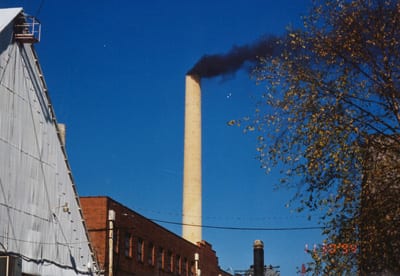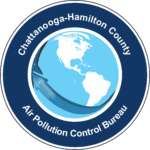Businesses
In Hamilton County, the Air Pollution Control Board and the EPA have primary enforcement authority for air pollution regulations. We have been granted a Certificate of Exemption, which means that the State of Tennessee has relinquished its primary authority to enforce air pollution regulations within Hamilton County and its included municipalities.
The Air Pollution Control Bureau is a regulatory agency for outdoor air quality. We regulate various types of companies and issue permits outlining the rules for their emissions. We issue four primary types of permits: asbestos, industrial, gasoline dispensing facilities and dry cleaning facilities.
The most significant way that the Air Pollution Control Bureau controls air pollution in Hamilton County is by permitting facilities that are potential sources of air pollutants. All industry operating in Hamilton County that have the capability to emit any air pollutant is required to obtain an air pollution permit. This permit may be in the form of a Certificate of Operation for minor and synthetic minor pollution sources or a Part 70 Operating Permit for major sources. The Bureau engineering staff address all permitting issues for the companies to which they are assigned, conduct annual inspections, track air emissions and develop special operating conditions to ensure compliance with the applicable rules and regulations.
Industrial Source Definitions
Major Sources (Part 70 Operating Permits)

As mandated by Title V of the Clean Air Act Amendments of 1990, the Bureau implemented an operating permit program that applies to major sources of air pollution. In 1996, the EPA approved the program. In addition, Congress required that a fee structure be put into place to have the major sources pay for the administrative costs of the permit program, thus shifting the burden from tax payers and placing it on the sources of air pollution.
Local companies are considered major sources* of air pollution if they meet the following the following criteria:
- The potential to emit 100 tons or more per year of any criteria pollutant
- The potential to emit 10 tons or more per year of any one of the 187 listed hazardous air pollutants or
- 25 tons or more of any combination of the listed hazardous air pollutants
- Acid precipitation sources
- Any other source the EPA Administrator determines by rulemaking should be included.
* Certain companies are required by EPA to keep their major source status even if they no longer pollute at major-source levels.
Synthetic Minor Sources
These pollution sources have the potential to emit what would be considered major source levels of air pollutants, subjecting them to Part 70 requirements, but have agreed to enforceable permit limitations to reduce their potential to emit. As long as these sources do not violate the conditions which are placed in their current certificates of operation, they are not subject to Part 70 requirements and fees.
Minor Sources
Companies that have the potential to emit pollution but do not meet the major source criteria are under this classification. Minor source companies must obtain a certificate of operation for each piece of equipment or process that may release pollutants into the air. Special operating conditions are developed for each certificate to ensure compliance with all application rules and regulations. The minor sources are subject to the same regulations as Part 70 major sources and synthetic minor sources.
Installation Permits
All industries that are potential sources of air pollution, unless specifically exempt as determined in the Air Pollution Ordinance, Section 4-56(c)(11) and (12), must receive an installation permit before constructing, installing, or reconstructing any equipment that has the potential to emit air pollutants. Installation permits contain emissions limitations and operating requirements that must be agreed to by the source prior to receiving the permit. A Certificate of Operation must be issued or a Part 70 permit application must be received prior to operating the equipment. In addition, all installation permits, with the exception of New Source Review (NSR) cases which may require more time, are required to undergo a 30 day public participation opportunity period.
For additional information, contact the Bureau Engineering Manager at 423.643.5978.
Permit Forms
Asbestos
The Air Pollution Control Bureau issues permits for the following commercial projects:
- Demolition with or without regulated asbestos;
- Renovation with regulated asbestos removal; or
- Asbestos removal only.
Gasoline Facilities
The Air Pollution Control Bureau permits gas stations for Stage 1 Vapor Recovery Systems to reduce the release of pollution into the air and conducts annual inspections to ensure compliance.
Dry Cleaners
The Air Pollution Control Bureau is required to permit and inspect annually, any dry cleaning facility that uses perchloroethylene by the National Perchloroethylene Air Emissions Standards for Dry Cleaning Facilities.
Major Sources
The Air Pollution Control Bureau permits and performs annual inspections of major industrial sources that have the potential to emit air pollutants. To determine your source status, please see the Industrial Source Definitions section above.
Minor/Synthetic Minor Sources
The Air Pollution Control Bureau permits and performs annual inspections of minor/synthetic minor industrial sources that have the potential to emit air pollutants. To determine your source status, please see the Industrial Source Definitions section above.

